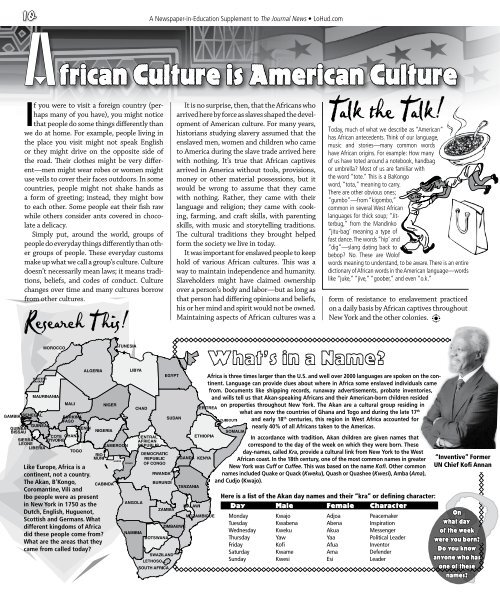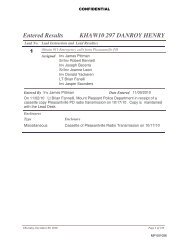Slavery in the Lower Hudson Valley - The Journal News
Slavery in the Lower Hudson Valley - The Journal News
Slavery in the Lower Hudson Valley - The Journal News
Create successful ePaper yourself
Turn your PDF publications into a flip-book with our unique Google optimized e-Paper software.
10<br />
A <strong>News</strong>paper-<strong>in</strong>-Education Supplement to <strong>The</strong> <strong>Journal</strong> <strong>News</strong> • LoHud.com<br />
A frican Culture is American Culture<br />
If you were to visit a foreign country (perhaps<br />
many of you have), you might notice<br />
that people do some th<strong>in</strong>gs differently than<br />
we do at home. For example, people liv<strong>in</strong>g <strong>in</strong><br />
<strong>the</strong> place you visit might not speak English<br />
or <strong>the</strong>y might drive on <strong>the</strong> opposite side of<br />
<strong>the</strong> road. <strong>The</strong>ir clo<strong>the</strong>s might be very different—men<br />
might wear robes or women might<br />
use veils to cover <strong>the</strong>ir faces outdoors. In some<br />
countries, people might not shake hands as<br />
a form of greet<strong>in</strong>g; <strong>in</strong>stead, <strong>the</strong>y might bow<br />
to each o<strong>the</strong>r. Some people eat <strong>the</strong>ir fish raw<br />
while o<strong>the</strong>rs consider ants covered <strong>in</strong> chocolate<br />
a delicacy.<br />
Simply put, around <strong>the</strong> world, groups of<br />
people do everyday th<strong>in</strong>gs differently than o<strong>the</strong>r<br />
groups of people. <strong>The</strong>se everyday customs<br />
make up what we call a group’s culture. Culture<br />
doesn’t necessarily mean laws; it means traditions,<br />
beliefs, and codes of conduct. Culture<br />
changes over time and many cultures borrow<br />
from o<strong>the</strong>r cultures.<br />
Research This!<br />
It is no surprise, <strong>the</strong>n, that <strong>the</strong> Africans who<br />
arrived here by force as slaves shaped <strong>the</strong> development<br />
of American culture. For many years,<br />
historians study<strong>in</strong>g slavery assumed that <strong>the</strong><br />
enslaved men, women and children who came<br />
to America dur<strong>in</strong>g <strong>the</strong> slave trade arrived here<br />
with noth<strong>in</strong>g. It’s true that African captives<br />
arrived <strong>in</strong> America without tools, provisions,<br />
money or o<strong>the</strong>r material possessions, but it<br />
would be wrong to assume that <strong>the</strong>y came<br />
with noth<strong>in</strong>g. Ra<strong>the</strong>r, <strong>the</strong>y came with <strong>the</strong>ir<br />
language and religion; <strong>the</strong>y came with cook<strong>in</strong>g,<br />
farm<strong>in</strong>g, and craft skills, with parent<strong>in</strong>g<br />
skills, with music and storytell<strong>in</strong>g traditions.<br />
<strong>The</strong> cultural traditions <strong>the</strong>y brought helped<br />
form <strong>the</strong> society we live <strong>in</strong> today.<br />
It was important for enslaved people to keep<br />
hold of various African cultures. This was a<br />
way to ma<strong>in</strong>ta<strong>in</strong> <strong>in</strong>dependence and humanity.<br />
Slaveholders might have claimed ownership<br />
over a person’s body and labor—but as long as<br />
that person had differ<strong>in</strong>g op<strong>in</strong>ions and beliefs,<br />
his or her m<strong>in</strong>d and spirit would not be owned.<br />
Ma<strong>in</strong>ta<strong>in</strong><strong>in</strong>g aspects of African cultures was a<br />
Talk <strong>the</strong> Talk!<br />
Today, much of what we describe as “American”<br />
has African antecedents. Th<strong>in</strong>k of our language,<br />
music and stories—many common words<br />
have African orig<strong>in</strong>s. For example: How many<br />
of us have toted around a notebook, handbag<br />
or umbrella? Most of us are familiar with<br />
<strong>the</strong> word “tote.” This is a BaKongo<br />
word, “tota,” mean<strong>in</strong>g to carry.<br />
<strong>The</strong>re are o<strong>the</strong>r obvious ones;<br />
“gumbo”—from “kigombo,”<br />
common <strong>in</strong> several West African<br />
languages for thick soup; “Jitterbug,”<br />
from <strong>the</strong> Mand<strong>in</strong>ko<br />
“jitu-bag’ mean<strong>in</strong>g a type of<br />
fast dance. <strong>The</strong> words “hip’ and<br />
“dig”—slang dat<strong>in</strong>g back to<br />
bebop? No. <strong>The</strong>se are Wolof<br />
words mean<strong>in</strong>g to understand, to be aware. <strong>The</strong>re is an entire<br />
dictionary of African words <strong>in</strong> <strong>the</strong> American language—words<br />
like “juke,” “jive,” “goober,” and even “o.k.”<br />
form of resistance to enslavement practiced<br />
on a daily basis by African captives throughout<br />
New York and <strong>the</strong> o<strong>the</strong>r colonies. b<br />
Like Europe, Africa is a<br />
cont<strong>in</strong>ent, not a country.<br />
<strong>The</strong> Akan, B’Kongo,<br />
Coromant<strong>in</strong>e, Vili and<br />
Ibo people were as present<br />
<strong>in</strong> New York <strong>in</strong> 1750 as <strong>the</strong><br />
Dutch, English, Huguenot,<br />
Scottish and Germans. What<br />
different k<strong>in</strong>gdoms of Africa<br />
did <strong>the</strong>se people come from?<br />
What are <strong>the</strong> areas that <strong>the</strong>y<br />
came from called today?<br />
What’s <strong>in</strong> a Name?<br />
Africa is three times larger than <strong>the</strong> U.S. and well over 2000 languages are spoken on <strong>the</strong> cont<strong>in</strong>ent.<br />
Language can provide clues about where <strong>in</strong> Africa some enslaved <strong>in</strong>dividuals came<br />
from. Documents like shipp<strong>in</strong>g records, runaway advertisements, probate <strong>in</strong>ventories,<br />
and wills tell us that Akan-speak<strong>in</strong>g Africans and <strong>the</strong>ir American-born children resided<br />
on properties throughout New York. <strong>The</strong> Akan are a cultural group resid<strong>in</strong>g <strong>in</strong><br />
what are now <strong>the</strong> countries of Ghana and Togo and dur<strong>in</strong>g <strong>the</strong> late 17 th<br />
and early 18 th centuries, this region <strong>in</strong> West Africa accounted for<br />
nearly 40% of all Africans taken to <strong>the</strong> Americas.<br />
In accordance with tradition, Akan children are given names that<br />
correspond to <strong>the</strong> day of <strong>the</strong> week on which <strong>the</strong>y were born. <strong>The</strong>se<br />
day-names, called Kra, provide a cultural l<strong>in</strong>k from New York to <strong>the</strong> West<br />
African coast. In <strong>the</strong> 18th century, one of <strong>the</strong> most common names <strong>in</strong> greater<br />
New York was Cuff or Cuffee. This was based on <strong>the</strong> name Kofi. O<strong>the</strong>r common<br />
names <strong>in</strong>cluded Quake or Quack (Kweku), Quash or Quashee (Kwesi), Amba (Ama),<br />
and Cudjo (Kwajo).<br />
Here is a list of <strong>the</strong> Akan day names and <strong>the</strong>ir “kra” or def<strong>in</strong><strong>in</strong>g character:<br />
Day Male Female Character<br />
Monday Kwajo Adjoa Peacemaker<br />
Tuesday Kwabena Abena Inspiration<br />
Wednesday Kweku Akua Messenger<br />
Thursday Yaw Yaa Political Leader<br />
Friday Kofi Afua Inventor<br />
Saturday Kwame Ama Defender<br />
Sunday Kwesi Esi Leader<br />
“Inventive” Former<br />
UN Chief Kofi Annan<br />
On<br />
what day<br />
of <strong>the</strong> week<br />
were you born?<br />
Do you know<br />
anyone who has<br />
one of <strong>the</strong>se<br />
names?






